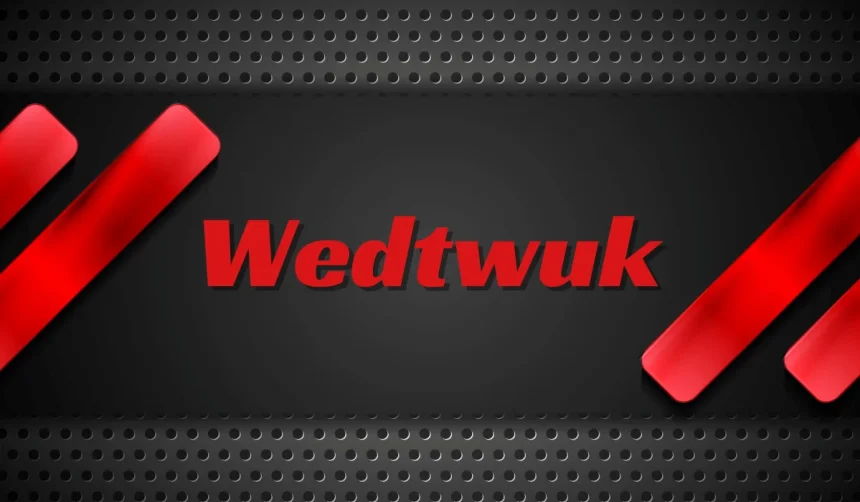Wedtwuk is an emerging concept that has been garnering attention across various industries, particularly in the realms of technology, business, and social innovation. At its core, Wedtwuk represents a synthesis of cutting-edge digital technologies and traditional practices aimed at fostering community engagement, sustainability, and economic resilience. The term itself may be unfamiliar to many, but its implications are far-reaching and hold significant potential for shaping the future.
The Origins and Evolution of Wedtwuk
The origin of the term “Wedtwuk” is somewhat obscure, yet it has become a buzzword among tech enthusiasts and industry leaders. It is believed to have emerged from a blend of different linguistic roots, symbolizing unity and collaboration. This concept has evolved rapidly, driven by advancements in technology and a growing recognition of the need for sustainable development. Initially, Wedtwuk was associated with grassroots movements and small-scale initiatives aimed at leveraging technology for local benefits. Over time, it has expanded to encompass a wide array of applications, from smart cities and digital governance to blockchain technology and social entrepreneurship.
Education and Learning
The field of education stands to benefit immensely from the principles and technologies of Wedtwuk. Digital learning platforms, driven by AI and big data, offer personalized educational experiences that cater to the unique needs and learning styles of each student. Virtual classrooms and online courses provide access to quality education for individuals in remote or underserved areas, breaking down geographical barriers. Moreover, interactive and immersive learning technologies, such as augmented reality (AR) and virtual reality (VR), can make complex subjects more understandable and engaging, fostering a deeper understanding and retention of knowledge.
Healthcare and Well-being
In the healthcare sector, Wedtwuk promotes the use of telemedicine, electronic health records, and AI-driven diagnostics to improve patient care and accessibility. Telemedicine enables patients to consult with doctors remotely, reducing the need for travel and increasing access to healthcare services, especially in rural or isolated regions. Electronic health records streamline patient information management, enhancing the efficiency and accuracy of medical care. Additionally, AI algorithms can analyze vast amounts of medical data to provide early diagnosis and personalized treatment plans, leading to better health outcomes.
Agriculture and Food Security
Wedtwuk’s impact on agriculture is profound, with smart farming technologies revolutionizing the way food is produced. Precision agriculture uses IoT devices and drones to monitor crop health, soil conditions, and weather patterns, enabling farmers to make data-driven decisions that optimize yield and reduce resource use. This not only increases productivity but also minimizes environmental impact. Furthermore, blockchain technology can enhance food security by ensuring transparency and traceability in the supply chain, helping to prevent food fraud and ensure the safety and quality of agricultural products.
Business and Commerce
In the business world, Wedtwuk encourages the adoption of digital transformation strategies to enhance operational efficiency and customer engagement. E-commerce platforms and digital marketing tools enable businesses to reach a global audience and offer personalized shopping experiences. Additionally, blockchain technology and smart contracts can streamline transactions and reduce fraud in financial dealings. The gig economy, facilitated by digital platforms, allows individuals to offer their skills and services on a flexible basis, promoting economic inclusion and empowerment.
Urban Planning and Development
Urban planning and development are undergoing a paradigm shift with the integration of Wedtwuk principles. Smart city initiatives use technology to improve infrastructure, transportation, and public services. IoT sensors and data analytics help manage traffic flow, reduce energy consumption, and enhance public safety. Moreover, participatory urban planning platforms enable residents to contribute their ideas and feedback, ensuring that development projects meet the needs and aspirations of the community. Sustainable building practices and green technologies are also promoted to create environmentally friendly and livable urban spaces.
The Role of Policy and Governance
For Wedtwuk to reach its full potential, supportive policies and governance frameworks are essential. Governments and regulatory bodies need to create an enabling environment that fosters innovation while ensuring ethical standards and data protection. This includes investing in digital infrastructure, providing incentives for sustainable practices, and establishing clear guidelines for the ethical use of technology. Public-private partnerships can also play a crucial role in scaling Wedtwuk initiatives, leveraging the strengths of both sectors to drive comprehensive development.
Estonia’s Digital Society
One of the most notable examples of Wedtwuk in action is Estonia’s transformation into a digital society. The country has implemented e-governance solutions that allow citizens to access a wide range of public services online, from voting to tax filing. Estonia’s X-Road platform facilitates secure data exchange between different government agencies, enhancing efficiency and transparency. This digital infrastructure has not only improved public service delivery but also fostered a vibrant tech ecosystem.
Barcelona’s Smart City
Barcelona is another city that has embraced Wedtwuk principles to become a leading smart city. The city uses IoT sensors and data analytics to manage urban services, such as waste collection, lighting, and transportation. Barcelona’s commitment to sustainability is evident in its extensive use of renewable energy and green spaces. The city also promotes citizen participation through digital platforms, allowing residents to engage in decision-making processes and contribute to urban planning initiatives.
Rwanda’s Tech-Driven Development
Rwanda offers a compelling example of how Wedtwuk can drive development in emerging economies. The country has invested heavily in ICT infrastructure and digital literacy, positioning itself as a tech hub in Africa. Initiatives such as the Kigali Innovation City aim to attract tech companies and foster innovation. Additionally, Rwanda’s use of drones for medical deliveries showcases the potential of technology to address pressing healthcare challenges in remote areas.
Conclusion: The Future of Wedtwuk
Wedtwuk is more than just a trend; it is a comprehensive approach that integrates technology with traditional practices to create a more inclusive, sustainable, and resilient future. Its applications across various sectors demonstrate its versatility and transformative potential. By embracing the core principles of community engagement, sustainability, innovation, and collaboration, societies can harness the power of Wedtwuk to address contemporary challenges and build a better tomorrow.
As we look ahead, the continued advancement of technology and the growing emphasis on sustainable development will likely propel Wedtwuk to new heights. The journey of Wedtwuk is a testament to the power of human ingenuity and the endless possibilities that arise when technology is used for the greater good. By staying committed to its principles and fostering an environment of inclusivity and innovation, we can ensure that Wedtwuk remains a driving force for positive change in the years to come.
Frequently Asked Questions About Wedtwuk
1. What is Wedtwuk?
Wedtwuk is an innovative concept that combines cutting-edge digital technologies with traditional practices to promote community engagement, sustainability, and economic resilience. It involves the application of technologies such as IoT, AI, blockchain, and more across various sectors to create smarter, more sustainable, and inclusive solutions.
2. How does Wedtwuk benefit communities?
Wedtwuk benefits communities by enhancing public services, promoting active participation in decision-making, and improving the overall quality of life. For instance, smart city initiatives can optimize traffic flow and reduce energy consumption, while digital governance platforms increase transparency and efficiency in public administration.
3. What sectors can implement Wedtwuk?
Wedtwuk can be implemented across a wide range of sectors including education, healthcare, agriculture, business, and urban planning. In education, it facilitates personalized learning experiences; in healthcare, it improves access to medical services; and in agriculture, it promotes smart farming practices, among other applications.
4. What challenges does Wedtwuk face?
Wedtwuk faces challenges such as the digital divide, ensuring data privacy and security, and the need for supportive policies and governance frameworks. Addressing these challenges involves investing in digital infrastructure, creating ethical guidelines for technology use, and ensuring equitable access to technological benefits.
5. How can individuals contribute to the success of Wedtwuk?
Individuals can contribute to the success of Wedtwuk by actively participating in community initiatives, staying informed about technological advancements, and advocating for sustainable and inclusive practices. Engaging with digital platforms for civic participation and supporting local tech-driven projects can also help drive the positive impact of Wedtwuk










